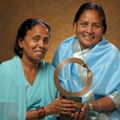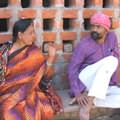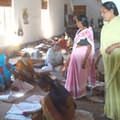|
1984年12月3日的夜晚,位於印度中部的波帕爾市發生了聯合碳化公司(Union
Carbide)所隸屬的殺蟲劑工廠外洩大量毒氣,導致8,000人死亡。20多年來,因毒氣外洩災害而陸續死亡的人數已逼近2萬人,並衍生無數畸形兒誕生以及一連串其他令人擔心的健康問題。

蘇克拉(圖左)和拉悉達.畢(照片提供:環保金人獎主辦單位)
「當年還是小嬰兒便暴露在毒氣中的年輕女性,現在產生各種不同的月經失調症狀,還有一些人在25歲或30歲時,便提早步入更年期」,波帕爾市災變生還者拉悉達.畢說道。現年48歲的畢,和同樣是毒氣外洩的受害者──現年52歲的蘇克拉,想為當晚的生還者及持續遭受後遺症困擾的年輕一輩討回公道。
兩位女士正幫助帶領一項對抗道氏化學公司(Dow
Chemical)及其旗下「聯合碳化公司」的國際性反對運動。1999年,她們和其他災難受害者提起對聯合碳化公司的共同訴訟,這個訴訟案目前仍在美國的司法系統下進行。畢和蘇克拉於2002年在印度首都新德里動員一場持續19天的絕食抗議活動,要求聯合碳化公司前執行長華倫.安德森面對波帕爾市災變的刑事審判。他們也呼籲道氏化學公司對災難生還者及他們的小孩,提供長期的健康照顧,並負責整治這塊原本屬於聯合碳化公司的場址;此外,更要求該公司對那些因為罹患疾病而無法工作的生還者提供經濟援助。這場行動過後,全球抗議人士在各地發起絕食行動、抗議及集會抗爭響應,這一系列的反抗呼聲,被流行商業期刊《福布斯雜誌》認為是造成道氏化學公司股價下跌的原因。畢和蘇克拉計劃在2004年5月間,在道氏化學公司在美國密西根的股東大會上,提出他們的訴求。
兩位女士共享2004年「環保金人獎」6個得獎名額中的一個名額,這個大獎已於2004年4月19日在美國加州舊金山舉行頒獎典禮。以下是Grist雜誌透過翻譯人員與畢的談話。 |
On the night of December 3, 1984, in the central Indian city of Bhopal,
a massive poisonous gas leak from a Union Carbide pesticide factory
killed 8,000 people. Over the course of 20 years, the infamous disaster
has caused an estimated 20,000 deaths, countless birth defects, and a
litany of other serious health problems.

Shukla (left) and Bee. (Photo: Goldman
Environmental Prize)
"The young women who were exposed while they were infants have
different kinds of menstrual disorders, and some are going through early
menopause -- at age 25 or 30," says Bhopal survivor Rashida Bee. Bee,
48, and fellow disaster victim Champa Devi Shukla, 52, want justice for
those who survived that December night -- and for the younger generation
that continues to suffer its consequences.
The two women are helping to lead an international campaign against
Dow Chemical and its subsidiary Union Carbide. In 1999, they and other
disaster victims filed a class-action lawsuit against Union Carbide, a
case that is still making its way through the U.S. court system. In
2002, Bee and Shukla organized a 19-day hunger strike in New Delhi,
demanding that former Union Carbide CEO Warren Anderson face a criminal
trial in Bhopal. They also called for Dow to provide long-term health
care for survivors and their children, clean up the former Union Carbide
site, and supply economic support to survivors who can no longer work
due to illness. That action has been followed by hunger strikes,
protests, and rallies by activists around the world, an outcry that
Forbes magazine has blamed for a drop in Dow's stock price. In May, Bee
and Shukla plan to take their demands to Dow's shareholders meeting in
Michigan.
The pair shared one of the six 2004 Goldman Environmental Prizes,
awarded in a ceremony in San Francisco, Calif., on April 19. Grist spoke
to Bee through a translator. |
|
問:我知道這對妳來說或許困難,但是能否請妳描述記憶中聯合碳化公司所造成的災害? 答:那晚所發生的事是很難用言語形容的,但是我會簡短地描述。當時大家都沈睡著,突然孩子們在半夜裡咳嗽醒來。孩子們說他們覺得快窒息了,我們也有同樣的感覺。其中一個孩子將門打開,隨即有一陣雲霧飄進來,之後我們開始劇烈地咳嗽,像是我們的肺著火了一樣,同時我們的眼睛還不斷分泌出淚水。一個跑到室外的孩子說每個人都往外跑,所以我們也必需逃離這個地方。我們當時不知道是聯合碳化公司的毒氣瓦斯外洩,只覺得感覺上難受地嗆人,有人說是裝滿紅辣椒的倉庫著火的緣故。戶外是一片混亂,人們四處逃竄。我們的家人分散了,我跟著我的丈夫、父親,開始跑了起來。我們只能跑個半公里,因為我們都吸入了有毒氣體。我們的眼睛都腫得張不開,當我們勉強將眼睛扳開時,四目所見,周圍盡是死去的大人和小孩。我們跑了半公里之後便不得不休息,因為我們都幾乎無法呼吸了,根本沒辦法跑,而且我的父親也開始吐血,因此我們便坐了下來。

蘇克拉(圖左)和拉悉達.畢(照片提供:環保金人獎主辦單位)
問:毒氣外洩對妳和妳的家人有何影響?
答:在(毒氣外洩)當時,所有人都必需住院治療,我們都有一些嚴重的問題。我有幾個家人失蹤了好幾天,我必需在幾千個屍體中去找尋他們是否陳屍其中。當時所產生的問題是非常劇烈而嚴重的,但是我們並不知道問題會持續這麼久。我的父親及家裡其他人,共罹患了5種不同的癌症。當年毒氣外洩發生時還是小嬰兒的年輕女性,因為當時便暴露在毒氣中,現在產生各種不同的月經失調症狀,更還有一些人在25歲或30歲時便提早就經歷了更年期。所以她們大部份無法生育,或者有些人會生出有缺陷的胎兒。這種情形不只發生在我的家人身上,整個社區都是如此。因為外洩的毒氣破壞了體內的免疫系統,許多人都罹患了結核病。這些問題一直持續著。
問:我知道妳的訴求行動是始於妳在妳的工作場所中成立一個獨立社團。是什麼原因促始妳做這些行動?
答:我從家庭主婦與世隔離的身份──依據傳統回教習俗──走入社會開始工作(Grist註:畢放棄這項回教習俗,是因為在她家中養家活口的男性病得太重而無法工作。),遇到跟我有相似的或更壞遭遇的婦女。因此了解到這並不只是發生在我家庭的問題,而是有數以百計的家庭也遭受到同樣的問題。更了解到我們能夠而且必需一起團結──因為我們都同樣身受其害。
問:我猜想在你們社會中,女人成為政治上的激進份子是非比尋常的。請問妳的朋友們及鄰居們對於妳的工作有何反應?
答:我很幸運,有個全力支持我、對我所從事的事情有興趣的丈夫。我擁有家人及鄰居們的支持。人們總是對我所做的事情感到驚訝──他們納悶一個沒有受過教育以及只有貧窮背景的女人如何能這樣做──但是他們後來體會到我所做的事不只是為了波帕爾市,對整個世界也是有意義的。我樂觀期待將會有越來越多出身回教家庭的人們會了解到,他們不該把女人侷限在家庭中,至少我的鄰居們已經有這樣的體認。

畢和蘇克拉負責管理一家文具製造工廠的女工,這家工廠雇用波帕爾市災變生還者。(攝影:Andy Black)
問:我們能做些什麼以防止類似的事件發生?
答:為了擔保波帕爾市災難不再在別的地方發生,我們必需確保波帕爾市的人已經得到公正的對待。若對於公司及其高階主管有示範性的懲罰,那麼其他公司會在將危險強加於老百姓的生活及健康之前再三考慮。我們必需將波帕爾市的心聲散佈出去,並且確保災難的法律相關責任是集中在需負責的公司之上。
問:是什麼原因趨使妳前進?
答:是那些我身邊正受著疾病苦難的人們趨使我這樣做的。當我知道那些家庭的人正在挨餓,了解到那些嬰兒們喝著被污染的母奶,我知道我不能停下來,必需繼續努力。
問:妳將如何使用這筆獎金?
答:我們將把所有的獎金放入信託機構,然後信託機構會提供醫療協助給出生時有缺陷的嬰兒。信託機構也會提供工作給因為患病而無法工作的人們。我們也會成立小獎項提供給對抗團體組織犯罪的國內百姓。
問:獲得這個獎項對妳本人具有什麼意義?
答:這個獎肯定了我們的奮鬥,讓我們所標舉的議題更具公信力,彰顯出我們活動所根據的事實基礎。因為道氏化學公司一直試圖把我們抹黑成提出無理要求的邊緣團體,而這個獎項消解了那個謊言,顯示出我們的行動與要求是出於事實。 |
Grist: I realize this may be difficult
for you, but would you describe some of your memories of the Union
Carbide disaster?
Bee: It is
difficult to describe all that we went through that night in words, but
I will speak briefly. We were all sleeping that night, and suddenly in
the middle of the night the children woke up coughing. They said they
felt like they were being choked, and we felt that way too. One of the
children opened the door and a cloud came inside -- we all started
coughing violently, as if our lungs were on fire, and our eyes were
watering. One of the kids, who had gone outside, said everyone was
running away and that we all must run away. We did not know at that time
that it was poisonous gas from Union Carbide. People were saying that a
warehouse full of red chiles had caught fire, because that was how it
felt, terribly irritating. Outside, there was a commotion, with people
running everywhere. Our family was separated, and I with my husband and
father started running. We could only run for half a kilometer because
we were inhaling the gas. Our eyes were so swollen that we could not
open them -- when we pried our eyes open, all we saw were dead children
and people all around us. After running half a kilometer we had to rest.
We were too breathless to run, and my father had started vomiting blood,
so we sat down.

Bee in front of a clinic that treats
people still suffering from effects of the Union Carbide gas leak.
(Photo: Andy Black)
Grist: How have you and your families
been affected by the gas exposure?
Bee:
At the time [of the gas leak] all of us had to be hospitalized, we were
all having such severe problems. Some of my family members were missing
for a few days, and I had to look at thousands of dead bodies to find
out if they were among the dead. The problems were very intense and
acute at that time, but we did not know that the problems would last for
so long. My father and other people in my family have had five different
kinds of cancers. The young women who were exposed while they were
infants have different kinds of menstrual disorders, and some are going
through early menopause -- at age 25 or 30. So often they cannot produce
children, and the children they do produce often have birth defects.
This is not just in my family but all around in the community. Many
people have tuberculosis because the gas exposure caused damage to the
immune system. So these problems continue.
Grist: I understand your
activism began when you founded an independent union in your workplace.
What convinced you to do this?
Bee: When
I came out of our household after being isolated -- that isolation was
according to traditional Islamic custom -- I started working. [Editor's
note: Bee abandoned this custom because the male wage-earners in her
family were too sick to work.] I met with women who were in similar or
worse situations. I realized that it was not just the problem of my
family, but that hundreds and hundreds of other families have these
problems. I realized that we could and must come together, that this was
a problem common to all of us.
Grist: I imagine that it's unusual
for women in your community to become political activists. How have your
friends and neighbors reacted to your work?
Bee:
I've been fortunate to have a husband who provides full support to me
and is interested in what I do. I have support in my family and in my
neighborhood. People are always surprised at the things I do -- they
wonder how a woman with no education and a background of poverty does
what she does -- but they have come to appreciate that what I am doing
is not just for Bhopal but has meaning for the whole world. Now I am
hopeful that more people from Muslim families, at least in my
neighborhood, will realize that they should not keep women in the
confines of the house.

Bee and Shukla oversee women workers at a
stationery manufacturer that employs Bhopal survivors.(Photo: Andy
Black)
Grist: What can be done to prevent
similar disasters?
Bee:
To insure that Bhopal doesn't occur anywhere else, we must ensure that
justice is done in Bhopal. If there is exemplary punishment of the
corporation and its officials, then other corporations will think twice
before imposing risks on the life and health of ordinary people. We must
spread the word of Bhopal, and make sure that legal responsibility for
the disaster is fixed on the corporation that is responsible.
Grist: What keeps you going?
Bee: It
is the suffering of people around me that drives me to do what I am
doing. When I realize that families are starving, when I realize that
babies are nursing on poisoned breast milk, I know I cannot stop and
must continue with this.
Grist: What will you do with the
prize money?
Bee: We
will put all of this money into a trust, and the trust will provide
medical help to babies who are born with defects. The trust will also
provide employment for people who cannot work because of sickness. We
will also set up a smaller award in our own country for ordinary people
who fight corporate crime.
Grist: What does the prize itself
mean to you?
Bee: This
award, it affirms our struggle and makes the issues we are raising
credible. It brings out the truth in our campaign. Dow has been trying
to portray us as a fringe group with unreasonable demands. This award
nails that lie, and shows that our campaign and demands are based in
truth. |
